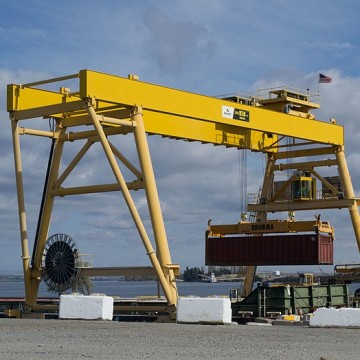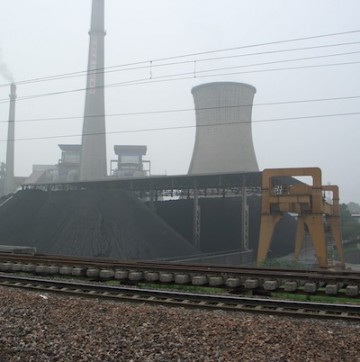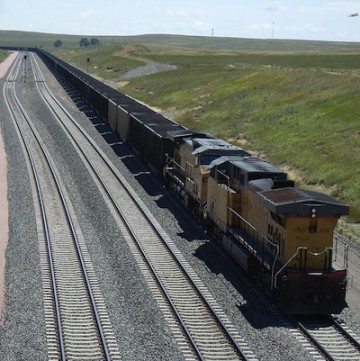Coal Export Terminal Rejected Amid Collapsing Global Market
Monday, October 06, 2014
Union Pacific train with open bed coal cars. Photo Credit: Wusel007, public domain
In August, Oregon environmentalists celebrated when the state ruled against a coal export terminal proposed for the Port of Morrow. Located along the Columbia River in East Oregon, the Coyote Island coal export terminal at the Port of Morrow in Boardman would have transferred nearly 8 million tons of Powder River Basin (PRB) coal from Montana and Wyoming onto barges bound for Asia.
The project was financed by Australian coal company Ambre Energy, which claimed the Morrow-Pacific project would create “thousands” of jobs.
For more than two years, the Coyote Island terminal proposal met with resistance from local communities and environmental activists. In 2003, a different coal export terminal plan was defeated in Coos Bay.
The Morrow-Pacific terminal would have sent an estimated 18 coal trains rolling through the Columbia Gorge each week, each one carrying a mile-long snake of uncovered coal cars exposed to the Gorge’s high winds.
Despite concerns raised about global warming and the threat of coal dust, the DSL ultimately rejected the project because terminal construction would have interfered with Native American fishing waters.
A Nightmare for the Coal Industry?
Many had considered approval of the Coyote Island project a foregone conclusion.
Instead, the denial raises doubts for two terminals proposed in Washington state. Along with the Coyote Island terminal, Ambre Energy partnered with fellow PRB coal producer Arch Coal to propose a $650 million coal export terminal facility at Longview’s Millennium Bulk Terminals along the Columbia River. This project would export nearly 44 million tons of coal to Asia annually.
Further north, the proposed Gateway Pacific deep-water marine terminal in Bellingham would annually export nearly 54 million tons of fossil fuels to Asia.
Shortly after DSL’s decision, an unnamed US coal official was quoted in the Aug. 22 edition of the McCloskey Coal Report:
“What’s really frightening about the Oregon decision is that the state of Washington has much stricter environmental laws than Oregon. Ambre’s project was expected to be easiest, and most likely to gain approval.
"This is the kind of thing that keeps coal producers awake at night.”
Clark Williams-Derry is deputy director of Seattle-based sustainability think tank Sightline Institute.
Many coal companies are in a precarious financial position as they attempt to export coal globally in the face of collapsing prices, declining stock values, tepid Wall Street support, and coal import fees, said Williams-Derry.

Port of Morrow in Boardman, Ore. Photo Credit: Visitor7, public domain
Wall Street investors have shown concern about coal since 2012, with Bank of America, Merrill Lynch and CitiBank offering dire assessments of coal’s future in Asia.
This past summer, both Korea and China imposed coal import fees, adding an extra cost to coal exports.
Mark Squillace of the University of Colorado’s Natural Resources Law Center said new additional costs such as import fees can make a big impact on coal’s profitability.
“When we are talking about millions of tons of coal, those costs add up,” Squillace said. “When you add the costs associated with exports -- transportation, shipping, and import fees -- suddenly cheap coal isn’t cheap. It’s risky to export coal on the international market. You’re never sure what steps countries will take to disincentivize coal exports.”
In a statement to GoLocalPDX, Gov. John Kitzhaber’s office echoed Squillace’s concerns about the viability of Northwest coal export projects: “[P]roposed export projects like this are by their very nature speculative; few of them go forward to construction because the industry is changing so fast and international markets are constantly in flux.”
Coal Will Go On With or Without Oregon
Stanford University’s Frank Wolak believes Oregon was wrong to deny the permit and that the coal industry will continue on with or without a port in the Beaver State.
“The only thing Oregon did is prevent the creation of good-paying jobs in the Powder River Basin coal region, high-paying jobs that don’t require an advanced degree,” Wolak said.
Wolak also disagrees with Wall Street’s skepticism about coal’s future in Asia.

China continues to be the world's largest consumer of coal. Photo Credit: SA 3.0, cc
Williams-Derry says Wolak’s comments reflect a 2011 mindset that assumes Asia’s demand for coal will continue for years. While China continues to open coal plants, they are more efficient, and older plants are being shuttered. The country also seeks to reduce overcapacity in the production of cement, glass, and steel, which are heavily dependent on coal for production.
“Maybe China’s demand will re-inflate,” Williams-Derry said. “The best predictor might be the stock prices of the U.S. companies looking to export overseas.”
Ambre, for its part, is not slowing down.
In a statement to GoLocalPDX, Ambre said that it had acquired the Decker Mine in the Powder River Basin and that the company intended to expand its operations in the Northwest and its exports to Asia.
“Ambre Energy is focused on developing new port infrastructure in the U.S. to facilitate an emerging coal export and marketing business. Ambre will be able to guarantee the supply of high-quality U.S. coal to customers in Korea, Japan and the Asia Pacific region from its operations."
Working with government, the community and partners, Ambre is developing world-class export infrastructure while creating jobs and trade opportunities.”
It remains to be seen what the future holds in store for Northwest coal export projects.
Both the Washington State Department of Ecology and the Army Corps of Engineers are conducting independent Environmental Impact Statements (EIS) of the Millennium Bulk Terminals coal export proposal.
The Gateway Pacific terminal in Bellingham is undergoing a similar review.
Depending on the outcome of these assessments, as well as public sentiment and the performance of the global coal market, any Northwest coal export terminals will not see operations for many years to come.
Related Articles
- Portland Ranks 11th in US Carfree Cities
- GoGreen Conference Hopes To Educate People About Sustainability





Follow us on Pinterest Google + Facebook Twitter See It Read It